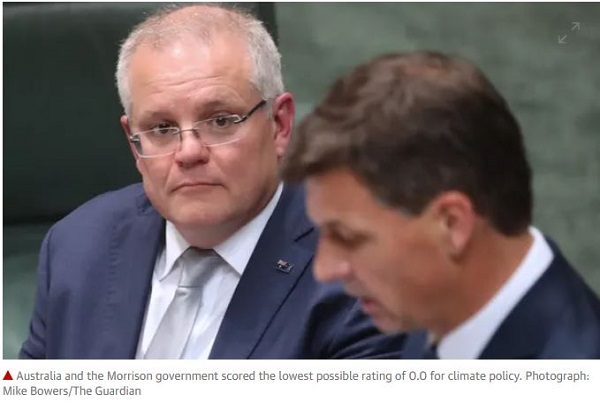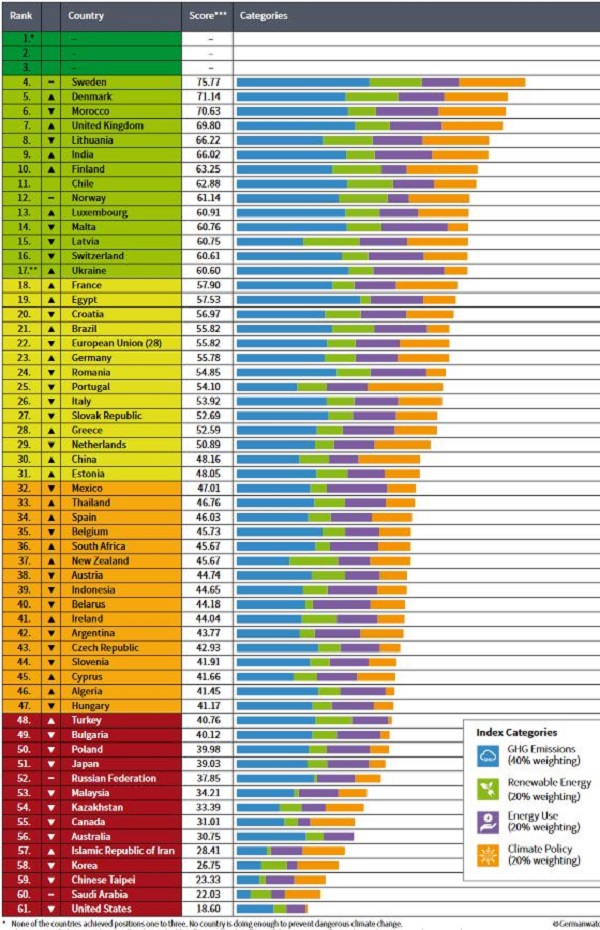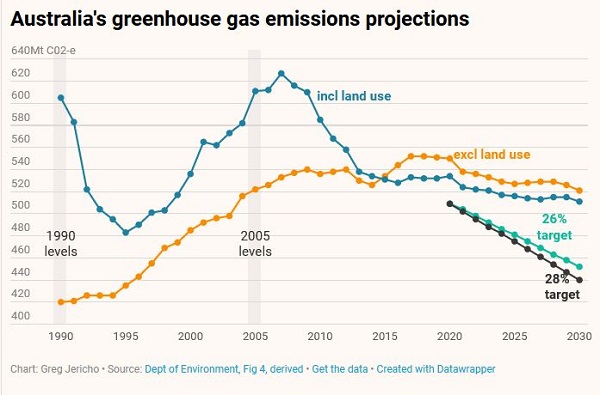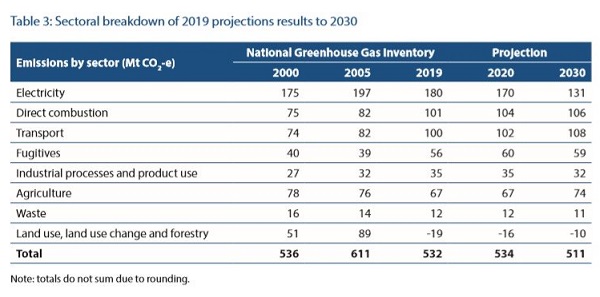Australia succeeded in coming bottom of the class of 57 countries on climate policy, achieving a score of 0.0, ahead of the USA on 2.8 and Turkey on 4.8 in a race to the bottom. That is out of 100, where Portugal got 98.7 and Finland 98.

Internationally we are seen as ‘an increasingly regressive force’, so a negative score would have been appropriate.
Apart from promoting the expansion of fossil fuels:
Experts note that the new government is an increasingly regressive force in negotiations and has been criticised for its lack of ambition by several Pacific Island nations in the context of this year’s Pacific Island Forum. The dismissal of recent IPCC reports, the government not attending the UN Climate Action Summit in September, and the withdrawal from funding the Green Climate Fund (GCF) underpin the overall very low performance in the Climate Policy category.
That was from the 2020 Climate Change Performance Index, prepared by a group of think tanks comprising the NewClimate Institute, the Climate Action Network and Germanwatch. They looked at national climate action across the weighted categories of emissions (40%), renewable energy (20%), energy use (20%) and policy (20%).
Overall Australia came sixth last, ahead of Iran, Korea, Chinese Taipei, Saudi Arabia and the United States. Here’s the list:

Australia has succeeded in reducing its standing on climate change action by refusing to increase its Paris commitments and brazenly using carry-over credits from the Kyoto Protocol. Greg Jericho did a hatchet job on this stunt in The Coalition isn’t being honest about the climate crisis. But neither is Labor*. He has an excellent graph on the Coalition’s record on emissions:

Frank Jotzo in Here In Madrid, The View Of Australia’s Tricky Tactics Is Not Pretty reminds us that Australia was given special exemption in the Kyoto negotiations to include land use in what became known as the “Australia clause”. We were also granted permission to increase emissions by 8% when most developed countries reduced emissions.
The peak in LULUCF (Land use, land-use change, and forestry) in 2005 coincides with Peter Beattie introducing punitive vegetation management laws in Queensland.
Without LULUCF Australia’s emissions rose from about 420 Mt to 540 Mt during the Kyoto period, or about 28%. So the “carryover credits” were basically fictional, a con.
This article in RenewEconomy shows a table projecting emissions from 2019 to 2030:

From 2005 to 2030 the total drops from 611 to 511, a reduction of 100 Mt. However, 99 of that comes from LULUCF.
Substantively we are doing nothing.
About 100 countries at UN climate talks are challenging Australia’s use of carryover credits.
Bill Hare, the chief executive of Climate Analytics in Berlin and a long-time adviser to developing countries at climate talks, said using carryover credits was opposed by three major negotiating blocs – the alliance of small island states, the least developed countries group and the independent alliance of Latin America and the Caribbean – as well as Canada, Switzerland and Norway.
The sad fact is that decisions at the UN talks are based on consensus, so Australia can simply veto against any motion banning the use of carryover credits. It will do so at the expense of its already appalling reputation. However, trade negotiations are another matter. France has already nominated emissions as a factor at play in negotiations between Australia and the EU on a trade deal.
If you listen to the first segment of the latest ABC RN Religion and Ethics Report (0.40 to 6.00) Andrew West interviews the Reverend James Bhagwan from Fiji, a Pentacostal and General Secretary of the Pacific Conference of Churches. Bhagwan was attending the UN climate talks in Madrid.
He said 80% of the Christians in the Pacific Islands area were Pentacostals. They judged fellow Pentacostals by their deeds and in those terms Scott Morrison, a Pentacostal, had been found wanting. Bhagwan explains using the parables of the Good Samaritan and the Prodigal Son. In climate terms the Pacific area was like the man beaten and bleeding on the side of the road. Morrison was like the Pharisee who walked on by.
He objected to Morrison using Pacific language to claim to be a good neighbour. He suggested Morrison would need to repent and seek forgiveness, like the prodigal son, in order to have “right relations” with his neighbours.
Greta Thunberg in her speech to the UN meeting in Madrid said:
- “The politics needed [for effective climate action] does not exist today despite what you might hear from world leaders. And I still believe that the biggest danger is not inaction. The real danger is when politicians and CEOs are making it look like real action is happening when in fact almost nothing is being done apart from clever accounting and creative PR.”
If you read the text, she had more than Australia in mind, but it fits us perfectly.
Meanwhile Angus Taylor and Morrison continually repeat their claim the Australia is taking strong action on climate. Taylor said the the solutions lie in technology.
Strange that Taylor and Morrison are now spruiking 50% renewable energy by 2030, which from Labor during the election was seen as economy wrecking.
Michele Grattan reports that Morrison’s spin is not stretching far enough to cover people’s concerns in her Friday piece Climate winds blowing on Morrison from Liberal party’s left. So some further largely cosmetic manouvres are in the pipeline.
*On Jericho’s incorrect and intellectually lazy assertion that Labor is being dishonest about the climate crisis, I hope to look at the real-world dilemma Australia faces with the coal export industry. Jericho has joined the ranks of people who expect political actors to be angry and shouty if the are to be taken seriously. Why would you expect a party to announce fully-formed policies three years out form the next election?
Labor has said multiple times that there will be no retreat, that they will follow the science, that climate change action is core business for the Party. On multiple occasions they have criticised the Coalition’s lack of an effective climate policy, as in Labor blasts government’s ’truly inadequate’ climate policies following scientists’ recommendation.
Did it occur to Jericho that the conference he was flying to was part of Labor reviewing its policies, that one of the guest speakers was Jeremy Rifkin, who advises China and Germany on how to governmemts can transact in the world that is to come, who written a library of books, including the hydrogen eceonony (in 2002) and the Green New Deal, or is he too perpetrating journalism that is looking for eyeballs? At least Michelle Grattan understands that Albanese can’t go on a listening tour in Central Queensland while telling them through a foghorn how they should live and what they should think, making the speech that Richard Flanagan has helpfully written for him.

Brian:
This hasn’t been a real factor so far but will become more important as more and more countries are being damaged by global warming and more and more countries will benefit from trade advantages being given to countries with good emissions performance.
The other thing you don’t mention is that more and more businesses see advantages in reducing their emissions and taking advantage of cheap renewable energy. The days where it was governments that had to drive emissions reduction if anything is going to be achieved to one where businesses, states, local government and individuals are ignoring the feds and getting on with it.
John, yes, to some extent business is getting on with the job, but not every business, and not to necessarily to the maximum extent possible.
Labor’s 2019 election policy, which I can only find now in summary in my post, had 22 specific actions which we would be far better off having than not having. Central was the treatment of the existing Safeguards Mechanism, which I summarised as follows:
Lacking a carbon tax or general carbon trading system, this policy element was central. Giles Parkinson pointed out that the LNP had been so slack in its administration that emissions had grown by 17%. Companies were doing as they please, and that was the overall result.
That was the element that the Greens dumped on because of the offshore offsets trading element, which was a minor part of the policy, and Shorten fell in a hole because he didn’t understand how to defend the policy from looking like an economy-wrecking exercise when distorted by ridiculous modelling and an aggressive journalist.
Some of the companies, if under pressure here, will happily relocate offshore to a developing country where no-one will bother them about emissions in the forseeable future.
So there is work for governments to do. However, this government is regressive. That is, its actions are a direct disincentive to many potential investors in the energy business.
Brian:
And incompetent. It seems to be unable to help set up the systems required for the power systems of the future.
From The Guardian:
Australia’s bushfires have emitted 250m tonnes of CO2, almost half of country’s annual emissions
Experts say the pulse of CO2 from this season’s bushfires is significant, because even under normal conditions it could take decades for forest regrowth to reabsorb the emissions.
But scientists have expressed doubt that forests already under drought stress would be able to reabsorb all the emissions back into soils and branches, and said the natural carbon “sinks” of forests could be compromised.
UN climate summit erupts in anger in Madrid as major economies resist bold action Looks like things are going backward, not forward.
don’t world leaders have grandchildren? Or do they think their wealth and power will protect their grandchildren from the consequences of their action?
John, it has been looking bad and worse. From your link:
I understand that Merkel has initiated a meeting between the EU and China to work on climate change next year, but I don’t think that happens until September.
This article argues that male resistance to climate action has bipartisan support.
Interesting article but it comes across by the end as a feminist attack on men as part of the gender wars that are distorting/taking over some discussions in society. In the end it was no surprise that the article was written by Megan MacKenzie, Professor of Gender and War at the University of Sydney.
On the other hand I have no simple theory to explain why some people are so reluctant to accept the data on climate change. I am certainly not the only male miner that sees climate change as the major threat to the well being of coming generations.
John, my impression is that Megan MacKenzie as Professor of Gender and War has her head full of stuff that prevents her from actually listening to people.
Katharine Murphy at The Guardian and Karen Middleton in the Saturday Paper do a better job.
Inter alia Murphy says:
Middleton begins:
Murphy says:
To that you can add Terri Butler, shadow for the environment, Plibersek, Murray Watt, shadow for northern development and others, as against Joel Fitzgibbon, who, for reasons not clear to me, supported Adani full bore when the Woods-Mackenzie report showed Adani would take jobs from the Hunter Valley.
Fitzgibbon’s view may give the impression that there is some almighty row going on inside Labor. As far as I can see there isn’t.
Anyone who thinks Albanese is “pathetic, weak, and afraid” has a view that is limited approximately to the end of their nose. I understand that LEAN began in Sydney in 2004, with Albanese as a foundation member. The story he’s chosen to tell is not as simple as some would like, but it is authentically his, and he knows that you don’t get anywhere yelling at people.
What you’d spend to prevent climate change — and what you could get with your money Works out that, on average, we are willing to spend $200/yr=$4billion/yr. Enough to:
With $4 billion, Chief Economist for the Australia Institute, Richard Denniss, said we could fit around a million houses each year with rooftop solar systems. OR
Or, each year we could fit around half a million houses with home battery systems. OR
French energy company Neoen recently revealed that South Australia’s giant Tesla battery cost $90 million. We could buy 44 a year at that price.
The list goes on.
For comparison, the Federal Government spends less than half that on cutting greenhouse emissions and almost 10 times that on defence.
New study: Changes in climate since 2000 have cut Australian farm profits 22%
Makes you wonder why farmers vote for the Nats instead of the Greens.
From Nine Newspapers (formerly Fairfax):
The Morrison government will invest $2.7 million to subsidise advanced smart meters for households, businesses and schools to monitor energy use, forecasting power bill savings for consumers.
The My Energy Marketplace program will be rolled out by the Australian Renewable Energy Agency (ARENA), which needs the data to see where, when and how much energy is coming back into the grid through the huge growth in rooftop solar and could use the program to tap household batteries.
Around 5000 households and businesses and 250 schools nationally will be accepted into the program. The data collected will be shared with the Australian Energy Market Operator (AEMO), which faces a challenge in integrating new power sources into the existing grid.
“Whether it’s rooftop solar, battery storage, energy efficiency, controlling electricity loads and appliances remotely, or the uptake of electric vehicles, we need better data to effectively run the future grid consisting of more and more decentralised consumer energy assets,” ARENA chief executive Darren Miller said.
ARENA is working on the My Energy Marketplace with private company Wattwatchers, which will stump up the remainder of the funding for the $8 million program.
Households can use the new smart meters to reduce their energy use by allowing retailers to tap into connected appliances such as air conditioners and refrigerators to control the temperature during peak periods.
While purchase and installation costs will be subsidised, participants will have to contribute, with households set to pay between $200 and $400 over three years, depending on individual factors.
* * ** *** ***** ********
So (correct me if I’ve misunderstood) in this tiny, cheap trial: participants will pay to have their energy use patterns and appliance consumption data monitored…..
The Federal Govt appears to have “privatised” electricity grid research: consumer participants actually pay for the privilege of providing data.
Gobsmacking.
So you’d prefer that didn’t happen Mr A, you think it will be increasing global warming ?
I wonder the reaction if Albo suggested the same thing…
I mean it was a possibility, till now and he has to condemn it as the work of the devil himself.
The trial/test run is fine with me.
It may assist in using rooftop generated power, and battery-stored power more efficiently.
Tomorrow in Victoria about 1500 households (in particular suburbs) have been asked to reduce their electricity consumption, and were offered a cash incentive to do so.
For what it’s worth, I’d like to see policies designed to encourage the installation of rooftop solar on rental dwellings, which must number in the many thousands.
In Victoria we have lots of smart meters, but far fewer rooftop solar installations than you have in more enlightened States such as
]choke on Weeties[
Queensland.
Ambi:
I may be missing something but I assume that here will be reduced power bills to the consumer as a result of this installation. $400 over 3 years would is 37 cents per day which might be easily achieved if the “controlled power” supplied into specially metered homes comes, as it should, at a discount.
In the past we have had controlled power in the form off-peak hot water heating.
In the new world of solar PV and wind we need a more sophisticated for of controlled power to minimize the need for expensive batteries.
My 2nd most problem with it from a data collection perspective is it won’t be representative of the general population. It’s not random sampling. The results will be skewed.
My No.1 problem is that it be used as representative, just like the ABC online poll votecompass thing.
I think it’s a pilot project introduced in two areas to see how it goes.
Ambi, I think they are going to pay people to (a) remotely through the grid turn down their aircon during peak periods, and/or (b) access the power on their rooftops and in their batteries during peak periods.
It’s not clear how much consumers will be paid, but I’d guess consumers could be in the black within a few years.
The ARENA site has information under Innovative new energy marketplace and Decentralised Energy Exchange (deX):
Qld has had PeakSmart for years where I think you get paid for the right for Energex or Ergon (the state distributor companies) to turn down your power during peak periods.
It’s a demand response power reserve scheme, I think. It’s not generally available here because you need a smart metre.
It’s all under the umbrella of working towards a distributed energy system, small steps at a time.
Will have to read further.
I’m not criticising any of these:
Rooftop solar
Feeding in excess power
Battery storage onsite
Demand management
Pilot programs
It just struck me that if you volunteer to participate, you might be offered a better deal.
We expanded our rooftop solar a couple of years ago. Even with a quite low feed in tarriff, the payback period is only 5 years. That’s a much higher return on our outlayed funds than we could earn anywhere else. And that’s with Victorian cloudy weather. Very happy.
It occurs to me that with smart meters widely used here in Victoria, the power retailers must by now have huge amounts of relevant power data, over a very representative sample in this State. Are those data shared with Federal agencies?
Climate leadership shifting from government to business The linked article was inspired by Goldman Sachs decision to rule out direct finance for new or expanding thermal coal mines and coal-fired power plant projects worldwide, as well as direct finance for new Arctic oil exploration and production.
The bank has also committed to phase out financing for significant thermal coal mining companies that do not have a diversification strategy.
Goldman Sachs also acknowledged that its policy “still lags behind its leading global competitors” and “remains far from alignment with what is needed to limit climate change to 1.5 degrees Celsius”.
So significant is the shift in global financial markets, some believe the world is at a watershed moment.
“The world could well look back on 2019 as the tipping point,” argues a new report released today by the Institute for Energy Economics and Financial Analysis (IEEFA).
“[The moment] when global capital markets accepted the technology-driven inevitability [of a] crossover from polluting thermal coal and increased uptake of sustainable clean renewable energy.”
My guess is that most of the Australian climate action to date has been driven by private investment rather than government action. If anything, the federal LNP has been doing its best to block climate action and generally stuff up the transition to 100% renewables.
John, that’s pretty much spot on, I think.
If we think back to the 2016 election, not all that long ago, climate change was barely mentioned.
Leaving aside the farcical nature of what happened in the 2019 election, it’s worth rereading David Spratt’s Climate emergency (1): “Something has shifted” from just last month. He cites Rebecca Huntley’s research with focus groups:
Then we have UN Secretary General António Guterres saying:
Regulators, lenders, and companies, where many have a concept of social responsibility that goes beyond PR (ironically Westpac has been prominent in this regard for many years) have been leading the way. Now Richard di Natale and others are putting pressure on Siemens, pointing out that the risk their reputation if they help Adani build its rail line.
No signals, no rail line.
Siemens has signed up to a UN Global Compact and the UN’s Caring for Climate initiative, which included the goal to take “urgent action to combat climate change and its impacts”.
Siemens can’t have it both ways.
Any way, the public discourse has changed radically, as Spratt says, ‘climate emergency’ has been normalised. History will no doubt ponder how much a Swedish teenager had to do with it.